Cityscape 2023: Urban Trends and Dubai Real Estate Insights
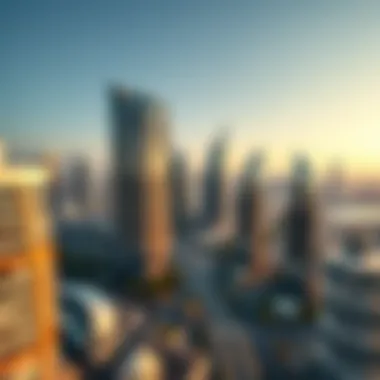
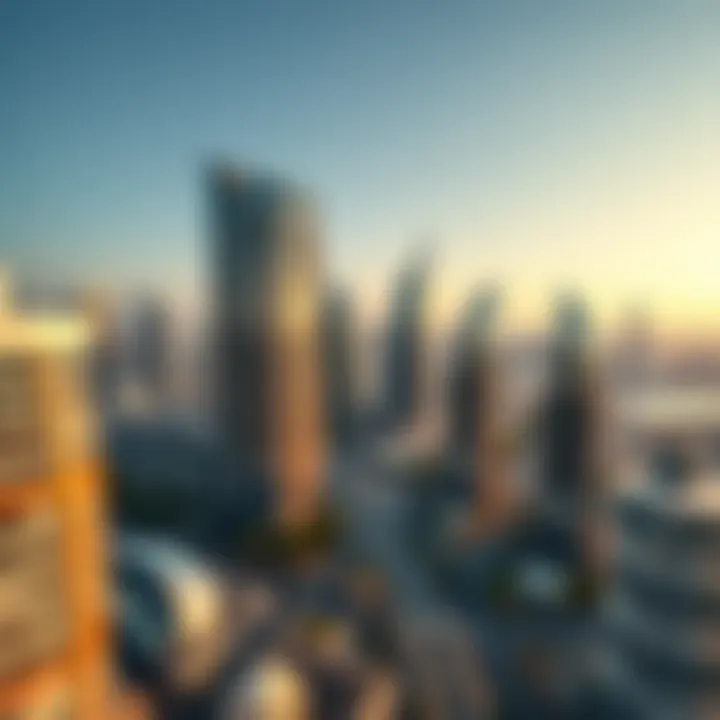
Intro
As we venture deeper into 2023, the urban landscapes, particularly in Dubai, tell a story of transformation and opportunity. The shifting dynamics of the city reflect not just architectural innovations but also shifting socio-economic tides that shape the real estate market. This is not merely about buildings and infrastructure; it’s about understanding how economic factors, demographic shifts, and emerging technologies harmonize to influence investment opportunities.
Through this exploration, we prepare both seasoned investors and curious newcomers to navigate an ever-evolving real estate terrain. Equipping oneself with an understanding of current trends is imperative. Let’s delve into the myriad aspects defining today's urban dynamics and real estate climate.
Market Trends
Current Real Estate Developments
Dubai's skyline continues to evolve, showcasing a myriad of developments that cater to diverse lifestyles and investment goals. Notably, large-scale projects like Dubai Creek Tower and the Dubai Marina expansion aim to bolster the city's appeal as a global hub.
Moreover, there has been an observable shift towards eco-friendly and smart city designs. Developers are increasingly incorporating sustainable practices that resonate with modern environmental consciousness. Initiatives such as solar-driven buildings and comprehensive waste management systems underline this trend.
According to recent reports, property prices show signs of steadiness with a marked interest in mid-range apartments, catering to a larger demographic pool.
"Understanding the pulse of the market is key for navigating investment opportunities in Dubai's flourishing landscape."
Impact of Economic Factors on Real Estate Prices
Economic trends significantly influence property prices and buying sentiment. The dynamics of supply and demand remain critical. Recent analysis indicates a robust rebound in Dubai's economy, recovering from any slumps experienced previously. Factors such as increased tourism and foreign investment fuel demand, propelling property prices upward.
The fluctuation of oil prices also plays a role—higher oil prices typically lead to increased economic activity, thereby impacting real estate positively. Additionally, regional political stability has fostered an inviting environment for investors, marking Dubai as a safe haven for property investment. Overall, the interlinked nature of the economy with real estate markets invites continuous observation and analysis.
Investment Strategies
Tips for First-time Buyers
Navigating Dubai's property market for the first time can feel daunting. Here are some practical tips:
- Research Thoroughly: Familiarize yourself with the neighborhoods. Areas like Jumeirah and Downtown Dubai have unique charms.
- Assess Your Budget Closely: Understand all costs involved, from property price to maintenance fees.
- Engage Qualified Agents: Collaborating with experienced real estate agents can offer insights and simplify the buying process.
Long-term vs Short-term Investment Approaches
Investors often grapple with deciding between a long-term or short-term investment strategy. Both have their merits:
- Long-term Investments offer stability and appreciation over time. Ideal for individuals looking to build wealth.
- Short-term Strategies, often involving flipping properties or renting short-term, capitalize on quick returns but require a keen understanding of market timing.
As you ponder your path, examining personal financial goals and market conditions will guide your decision-making, allowing you to place your bets wisely.
In wrapping up this segment, the landscape of urban dynamics in 2023 offers a canvas for strategic investments and bold choices. Charge forward with knowledge, as understanding the nuances in this vibrant market might just be the ace up your sleeve.
Preface to Cityscape in
The landscape of urban centers in 2023 serves as a microcosm of broader societal shifts. In this fast-paced world, the rhythms of cities echo the aspirations and challenges of their inhabitants. Understanding cityscapes is crucial for a variety of stakeholders, including investors and homeowners, as it can significantly influence property values, investment returns, and community engagement.
This article delves into the intricacies of urban dynamics, with a keen eye on the real estate market in Dubai. The city is often seen as a barometer for global urban trends due to its unique blend of cultural influences, rapid economic growth, and ambitious architectural projects. By examining the current state and future projections of urban environments, readers gain insights into what shapes cities and why it matters.
The Evolution of Urban Spaces
Cities are not static; they continually evolve in response to various factors. Urban spaces today reflect a historical tapestry interwoven with economic, social, and technological threads. Not so long ago, sprawling suburbs were the crown jewels of urban planning, designed for the car-centric lifestyle. However, a marked shift has taken place. The current generation is showing a preference for dense urban environments, where amenities are just a stone's throw away.
In Dubai, this evolution is evidenced by the transformation from traditional neighborhoods to mixed-use developments, which cater to a multicultural population that thrives on diversity. Places like the Dubai Marina or Downtown Dubai encapsulate this shift, where leisure, work, and residential spaces converge. Moreover, spaces are being designed to include more parks and communal areas, underscoring a significant shift towards promoting well-being and social interaction.
This evolutionary narrative is not just confined to aesthetics; it encompasses sustainability as well. With the looming specter of climate change, cities are reimagining how they use resources, manage waste, and integrate nature into urban settings. Individuals and businesses are focused on reducing their carbon footprints, pushing cities to adapt in real-time.
Key Trends Reshaping Cities
Several pivotal trends are currently reshaping the urban fabric. Notably, the intersection of technology and real estate is transforming how cities function. Smart cities leverage data and IoT technology to create more efficient systems. For instance, energy management and traffic flow optimization are now achievable through innovative tech solutions.
In addition to tech advancements, demographic changes are profound. Millennials and Gen Z individuals are entering the housing market with unique preferences, often seeking smaller, more efficient living spaces in vibrant neighborhoods. They prioritize experiences over possessions, leading to increased demand for homes that reflect their lifestyle aspirations.
- Sustainability: There's a strong push for green buildings that meet environmental benchmarks. This not only reduces energy costs but also enhances the quality of life.
- Remote Work: The pandemic catalyzed a dramatic shift toward remote work, implying that city centers no longer need to be solely focused on corporate offices.
- Public Transport: Investments in public transportation systems signal a forward-thinking approach to urban mobility. This not only curtails congestion but also enhances accessibility for all.
The Dubai Context
The landscape of urban development is not just shaped by buildings and roads; it is intricately tied to economic policies, cultural nuances, and demographic shifts. Within the scope of this article, Dubai holds a significant position, functioning as a microcosm of global urban dynamics. Understanding the context of Dubai necessitates a closer inspection of specific aspects, notably, its economic growth and demographics that fuel housing demand.
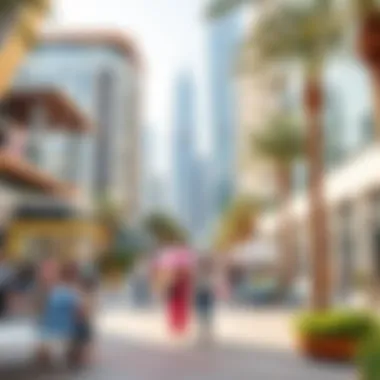
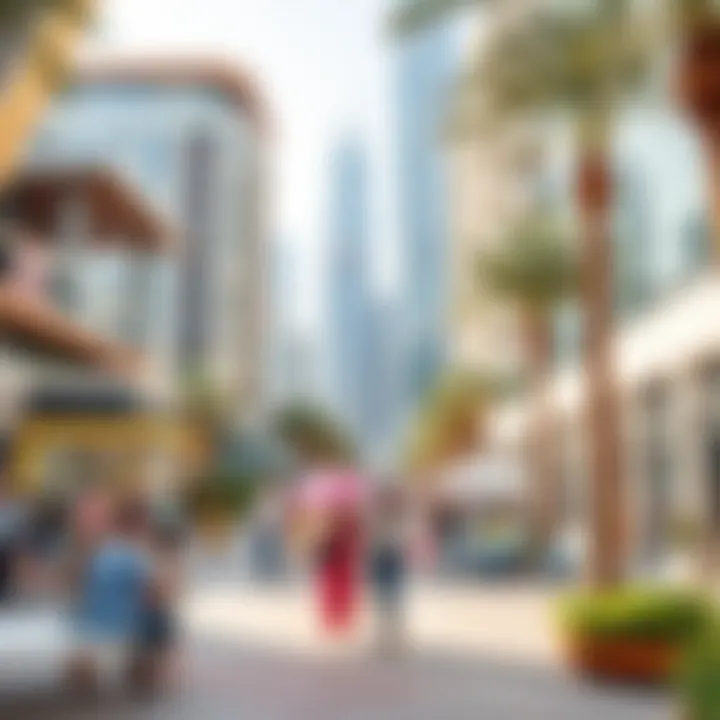
Economic Growth and Urban Development
Dubai's economy stands as a beacon of rapid growth, astonishing in its trajectory. The financial district burgeons, underscoring a vibrant business climate that draws investment like a moth to a flame. This economic vitality
- boosts urban development initiatives
- stimulates construction activities
- increases employment opportunities
As skyscrapers continue to pierce the skyline, they are not merely structures; they reflect the city's ambition. Investments in infrastructure are robust, leading to transportation networks that keep pace with the burgeoning population. The integration of cultural elements like art and community spaces into urban planning has also become a highlight, merging the old with the new in seamless fashion. Moreover, the visionary projects like Dubai Creek Tower aim to redefine the architectural landscape yet again, keeping the city at the forefront.
"Dubai’s economic landscape is as dynamic as its skyline; it’s not just about building more structures, but constructing a sustainable and prosperous future."
Demographics and Housing Demand
When examining the housing demand in Dubai, one cannot overlook the diverse demographic fabric of the city. An influx of expatriates combined with a growing native population creates a melting pot of needs and preferences in housing types.
As of 2023, the population has seen shifts that impact the real estate sector:
- Young professionals seek affordable luxuries, parking their hopes in areas like Dubai Marina.
- Families look for spacious townhouses in suburban locales, reflecting a desire for community-centered living.
- High-net-worth individuals continue to chase luxury in prime locations like Palm Jumeirah.
In addition to preferences, removal of certain restrictions on foreign property ownership has spurred demand, with various nationalities securing their foothold in the market. Furthermore, the focus on sustainability has nudged many developers to create housing solutions that are both futuristic and environmentally responsible. The increasing awareness of climate resilience is reshaping preferences, influencing buyers towards greener options.
In summary, the context surrounding Dubai is vital for grasping the ongoing trends in the urban dynamics of 2023.
Understanding its economic growth and demographic shifts provides critical insights into forecasting the future of the real estate market.
Architectural Innovations in
Architectural innovations are shaping the landscape of our cities, and 2023 is no exception. As urban areas evolve, so too does the architecture that supports them. This section will explore how modern design concepts are not only enhancing aesthetic appeal but also focusing on sustainability and technological integration, which ultimately have a significant impact on real estate development.
Sustainable Building Practices
Sustainable building practices have gained significant traction over the past few years. This is not just a trend; it reflects a required evolution in how we think about constructing our cities. Architects and developers are increasingly recognizing the importance of minimizing environmental impact while maximizing energy efficiency.
Some key aspects include:
- Use of Recyclable Materials: Many new buildings now incorporate recycled materials, reducing waste and promoting eco-friendliness. For instance, structures built with reclaimed wood or repurposed steel not only look unique but also tell stories of sustainability.
- Energy-Efficient Systems: Implementing energy systems that harness solar power and natural ventilation can dramatically reduce a building's carbon footprint. It’s become common to see installations like solar panels and green roofs that not only save energy but also improve the building’s efficiency.
- Water Conservation Technologies: Incorporating systems that harvest rainwater or recycle greywater helps to address water scarcity issues, especially in urban settings. Owners can take advantage of such technologies to enhance the value of their properties.
A significant trend in this regard can be seen in Dubai, where developers are investing in eco-conscious designs. Such practices aren't just good for the environment, but also provide long-term cost savings to homeowners and investors. The increasing demand for green buildings often leads to higher property values as more buyers prefer homes with sustainable features. This is especially true among millennials, who are willing to pay a premium for eco-friendly properties.
Smart Cities and Technology Integration
In today’s fast-paced world, the term 'smart city' is popping up everywhere. Smart city frameworks aim to improve the quality of life through technology. By integrating smart technologies into urban design, cities can optimize their operations and better serve their residents.
Here are some significant elements:
- Intelligent Infrastructure: Smart sensors are being utilized to manage streetlights, traffic systems, and waste management, which helps streamline city services. This integration increases efficiency and reduces operational costs.
- Connectivity: Incorporating 5G and other high-speed internet technology allows residents to connect seamlessly with city services and amenities. This leads to improved communication and enhances the overall urban experience.
- Data-Driven Decision Making: The use of data analytics in urban planning enables better insights into traffic patterns, resource usage, and public safety. Planners can make informed decisions that reflect the needs of the community.
These advancements not only address immediate urban challenges but foster an environment where both businesses and residents can thrive. Investors are paying close attention to properties located in smart cities since their projected growth is markedly higher than average. By aligning technological advancements with urban living, we are paving the way for a more efficient and vibrant future.
"Investment in architectural innovations will yield long-lasting benefits for the urban landscape, converting challenges into opportunities."
Overall, architectural innovations in 2023 exemplify a shift towards a more sustainable, high-tech urban environment. For investors, understanding these trends offers insights into where opportunities may lie in the evolving real estate market.
For more information on architectural innovations, check out resources like Wikipedia or Britannica.
Keep an eye on the ongoing developments in the property market as these architectural enhancements shape the future of urban living.
Market Trends in Dubai Real Estate
The real estate market in Dubai has become a focal point for investors, both local and international. Over the years, it has proven to be a resilient landscape, constantly adapting to changes in the economy, technology, and consumer sentiment. In 2023, understanding the market trends is paramount for anyone looking to make informed decisions in this vibrant city. The trends observed not only reflect economic realities but also provide insights into the future of urban living in Dubai.
Key elements of the market trends include:
- Robust demand for residential properties driven by expatriates.
- Significant industrial and commercial growth due to strategic investments.
- Evolution of luxury real estate catering to a well-heeled clientele.
- Increased focus on sustainable living spaces reflecting global concerns about climate.
These factors intertwine in a manner that deeply affects investment strategies, bringing numerous benefits and considerations.
Investment Opportunities
Dubai offers a plethora of investment opportunities that are as varied as the skyline. With a booming economy, the city has become an attractive hub for real estate investments. Properties in Dubai promise not only potential high returns but also a stable market for both short-term gains and long-term growth.
The opportunities are diverse:
- Residential Units: The demand for apartments and villas remains strong, especially in areas like Dubai Marina and Downtown Dubai.
- Commercial Properties: With the push for industrial developments, warehouses and office spaces are gaining traction, particularly within the Dubai South area.
- Vacation Rentals: The increasing influx of tourists creates a vibrant market for short-term rental properties.
Investors should consider the following when venturing into Dubai's real estate:
- Conduct thorough market research.
- Familiarize yourself with legalities surrounding property ownership.
- Stay updated on the latest trends in tenant preferences and regulations.
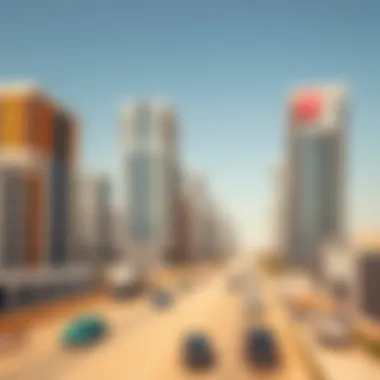
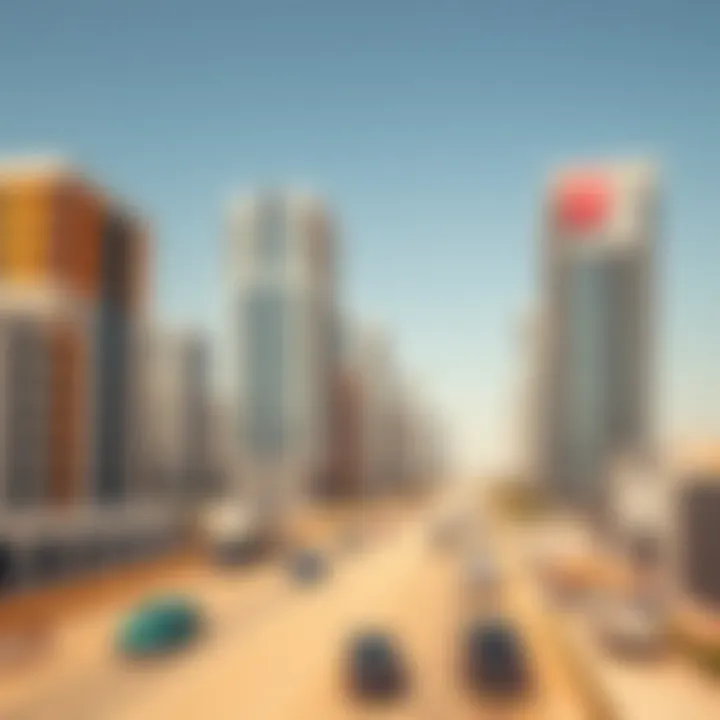
"In Dubai, real estate is not just about property; it’s about lifestyle and investment potential."
Buyer Preferences and Behavioral Shifts
The preferences of buyers in Dubai have significantly evolved over the past few years. As the city grows, so do the expectations of its residents. Factors influencing buyer behavior include cultural shifts, technological advancements, and an ever-changing economic climate.
Some notable shifts in buyer preferences are:
- Sustainability: Buyers are increasingly looking for eco-friendly homes, pushing developers to incorporate sustainable practices in their projects.
- Smart Homes: The infusion of technology into living spaces appeals to tech-savvy millennials and affluent buyers.
- Community Living: There’s a rising demand for communities that foster social interactions, featuring amenities like parks, gyms, and communal areas.
This behavioral shift is important as it pushes the market toward diversification, compelling developers to adapt to new needs.
Regulatory Changes Impacting the Market
In an ever-changing urban landscape, regulatory changes play a pivotal role in shaping the dynamics of the real estate market. These regulations are more than just bureaucratic hurdles; they can create roads for investment, guide urban development, and streamline housing processes. For those engaged--whether investors, homeowners, or agents--understanding these shifts is essential to grasp the pulse of the market.
New Policies and Regulations
As 2023 unfolds, a slew of new policies are entering the fray in Dubai's real estate sector. The government has implemented measures aimed at regulating property transactions more strictly, which is a double-edged sword. On one hand, these laws help safeguard buyers against fraud and misrepresentation. On the other, overly stringent regulations can slow down transactions and dissuade potential investors.
One notable policy is the introduction of enhanced due diligence for foreign buyers, which aims to tighten AML (anti-money laundering) protocols. Such a step may have short-term effects like a dip in foreign interest. However, this longer-term vision aims to cultivate a transparent market that can attract serious investors and enhance Dubai’s reputation globally. By eliminating unethical practices, the authorities are painting a clearer picture of the investment landscape, reassuring buyers on their decisions.
"A transparent market not only attracts investors but also establishes trust, which is key for robust city growth."
Effects on Foreign Investment
New regulations inevitably reshape how foreign investment operates within Dubai. With a combination of new taxes and tightened buyer requirements, foreign investors may find themselves navigating a more complex path. Yet, circumstances such as these can initially appear daunting but may lead to newfound opportunities.
For instance, regulations often lead to an upsurge in inquiries about quality over quantity. Buyers become more discerning, interested in properties that are compliant with the latest standards. This shift may encourage developers to focus on high-quality, innovative projects that meet stringent criteria, thus boosting market value in the long run.
Further, despite the immediate challenges that new regulations may pose, the long-term stability they aim for is likely to be favorable. Secure, ethically sound investment environments tend to attract discerning investors. They find value in transparency and reliability, ensuring that the market is not prone to sudden fluctuations driven by unsustainable practices.
- Reduced Risks: Foreign investors feel more secure when clear regulations are in place.
- Quality Assurance: Developers prioritize high-standard properties, improving the overall market.
- Investment Appeal: A reliable market becomes more attractive for serious investors.
As the dust settles on new regulations, those who adapt and understand these shifts will likely gain a competitive edge. Keeping an ear to the ground and staying informed can positively shape one's investment strategy. The ongoing evolution of regulatory frameworks holds the key to unlocking new potential within Dubai’s ever-evolving urban landscape.
Social and Cultural Influences
The fabric of urban life is woven not just with buildings and roads, but with the rich tapestry of social and cultural dynamics that define a city like Dubai. The influences of community identity, cultural integration, and social interactions play pivotal roles in shaping the urban landscape and, consequently, the real estate market. This section seeks to unpack these intricate dynamics, illustrating their significance in the context of Dubai's property scene in 2023.
Cultural Integration in Urban Design
Dubai stands as a living example of how vibrant cultural integration can breathe new life into urban design. The cityscape reflects an amalgamation of cultures that reside within its borders. With a significant expatriate population, you’ll find influences from across the globe — from the traditional souks that echo the Emirati heritage to modern shopping malls showcasing international brands. This unique blend is not merely cosmetic; it informs the architectural language of the city, leading to designs that welcome diverse cultural practices and communal activities.
- Blending of Architectural Styles: The architectural framework often mirrors the cultural identity of its residents. For example, you can see how Islamic design principles coexist with contemporary aesthetics in buildings like the Burj Khalifa and Dubai Opera. This visual dialogue fosters a sense of belonging among various cultures.
- Community Centers: They are popping up across the city to encourage interaction among different communities. These spaces function as melting pots, where cultural events take place, creating opportunities for residents to share and learn from each other.
- Art and Public Spaces: In addition to traditional structures, public art installations around Dubai are also significant. These art pieces speak volumes about the diverse cultural narratives present in the city, making urban environments more engaging and inclusive.
Ultimately, cultural integration leads to a more cohesive urban experience, which is attractive to potential residents and investors alike.
Community Building Initiatives
At the heart of any thriving urban landscape is a robust sense of community. In 2023, Dubai has witnessed a surge in initiatives aimed at fostering community spirit, which influences real estate dynamics in tangible ways. These initiatives create a sense of ownership and pride among residents, boosting demand for properties in well-connected neighborhoods.
- Neighborhood Associations: Many neighborhoods are forming associations that take charge of local activities, events, and safety measures. This grassroots movement not only empowers residents but also uplifts property values as neighborhoods become more desirable.
- Cultural Festivals and Events: These serve as catalysts for community bonding. Events like the Dubai Shopping Festival or Art Dubai not only draw tourists but also encourage residents to engage with each other, cultivating a stronger sense of place.
- Sustainability and Volunteer Programs: Initiatives aimed at environmental sustainability also play a significant role in building communities. Programs that encourage residents to participate in clean-up drives or tree plantation initiatives create a shared purpose, while also adding to the green landscape of the city.
The foresight in establishing community-driven initiatives can significantly enhance property desirability, drawing in families and individuals who prioritize social connections. As such, the intersection of social and cultural considerations with urban development remains invaluable in nurturing Dubai’s locality and driving future investment trends.
"Investing in community-driven developments not only enriches the urban fabric but also serves as a lucrative strategy for real estate investors seeking sustainable growth."
For further insights, you might explore Wikipedia on urban design or the local insights shared on Reddit. Further resources regarding Dubai’s urban initiatives can be found on government and educational sites to deepen understanding of these critical influences.
Environmental Considerations
In the ever-evolving urban landscape of Dubai, the importance of environmental considerations cannot be overstated. It is pivotal for ensuring sustainable growth while maintaining a balance between development and ecological preservation. As cities expand, the integration of environmentally friendly practices becomes a necessity rather than an option. This article explores the key components of environmental considerations in urban settings, particularly focusing on their benefits and implications in real estate.
Urbanization has historically led to a host of challenges including pollution, habitat loss, and increased carbon footprint. Consequently, the inclusion of thoughtful environmental strategies can significantly enhance the quality of life for residents while also attracting investors looking for sustainable options. This brings us to two critical aspects that reflect the pulse of the city's environmental ethos: urban green spaces and climate resilience strategies.
Urban Green Spaces
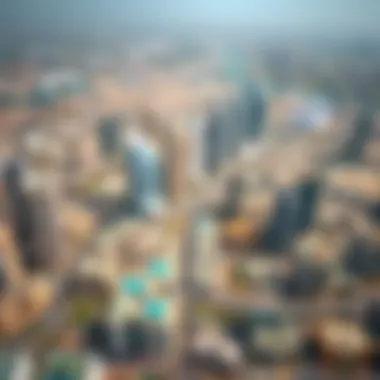

Urban green spaces serve as essential lungs for a city. They help reduce air pollution, support biodiversity, and provide residents with recreational areas that improve mental well-being. In Dubai, where urban expansion often overshadows natural landscapes, initiatives to integrate parks, gardens, and green rooftops are becoming increasingly vital.
The construction of areas like the Dubai Creek Harbour showcases how green spaces can be seamlessly blended into urban designs. Apart from aesthetic benefits, these spaces can enhance property values. Home seekers and investors alike tend to favor residences near parks or green belts due to their associated health benefits and increased accessibility to nature.
Moreover, these green areas can play a critical role in addressing urban heat effects. Plant life can help moderate temperatures, creating cooler microclimates that, in turn, reduce energy consumption for air conditioning. This is a boon not just for homeowners but also for the sustainability goals of the city.
- Benefits of Urban Green Spaces:
- Improved air quality
- Enhanced biodiversity
- Increased property values
- Promoted mental health
In the context of Dubai, the city is making strides at including parks that suit its climate and demographics. For instance, the Al Barsha Park and Al Qudra Lakes are examples of how authorities are thoughtfully integrating green spaces into the fabric of urban life.
Climate Resilience Strategies
With climate change posing ever-increasing threats, particularly in arid environments like Dubai, climate resilience strategies have become a necessity for sustainable urban development. These strategies are designed to mitigate the impacts of climate-related events, like flooding and heat waves, ensuring that infrastructure and human life can withstand these challenges.
For real estate developers, incorporating resilience strategies isn’t just about compliance with regulations; it’s about future-proofing developments against climatic uncertainty. The focus lies on creating structures that can manage extreme weather events while being energy-efficient.
Dubai has begun implementing initiatives like smart water management systems and heat-resistant building materials in new constructions. These steps are vital not only for reducing environmental impact but also for ensuring the longevity and durability of real estate investments. An increasing number of developers are now looking into sustainable practices for long-term benefits, a trend that resonates with socially conscious buyers.
"An investment in sustainable real estate is an investment in future resilience."
As these strategies come into play, investors can expect a shift in demand toward properties that demonstrate environmental responsibility. People are increasingly drawn towards communities that prioritize climate resilience, making properties that meet these criteria more valuable.
To summarize, environmental considerations in urban settings, specifically in Dubai, reflect a larger movement towards sustainability. Through the implementation of urban green spaces and climate resilience strategies, not only do we nurture our environment but we also create a more appealing real estate market for future inhabitants. Investing in such properties today could prove to be a savvy move as the world gradually shifts toward a greener future.
Technological Advancements Revolutionizing Real Estate
The landscape of real estate has dramatically shifted due to technological advancements that are reshaping how properties are bought, sold, and managed. In today’s fast-paced environment, these innovations are pivotal not just in streamlining transactions but also in enhancing decision-making processes for investors, agents, and homeowners alike. As cities evolve and competition increases, embracing these technologies becomes indispensable.
PropTech Innovations
The rise of Property Technology, commonly known as PropTech, marks a significant shift in the real estate sector. From virtual reality tours to blockchain transactions, PropTech helps to reduce friction in the buying and selling processes. Here are some notable innovations:
- Virtual Tours: These allow potential buyers to explore properties from the comfort of their own home, saving time and increasing engagement.
- Blockchain Technology: This offers a new level of transparency and security in property transactions, effectively reducing the potential for fraud.
- Smart Contracts: These can be created within blockchain systems, automating transactions and ensuring that all parties fulfill their obligations.
PropTech is not just a trend; it’s a necessity in the current market. Investors can leverage analytics tools to understand trends and forecast market demands, improving their chances of making profitable investments. Real estate agents use mobile apps to manage listings on-the-go, enhancing their ability to respond promptly to clients.
"In 2023, adopting the latest PropTech innovations is not merely beneficial; it’s essential for those who wish to thrive in the competitive realm of real estate."
Data Analytics in Urban Planning
Data analytics has emerged as a game-changer in urban planning. Utilizing data to inform decisions can lead to more efficient use of resources and better community outcomes. With advancements in technology, various forms of data analysis are becoming increasingly accessible. Key points include:
- Geospatial Analysis: This method uses geographic data to understand trends related to urban growth, traffic patterns, and community needs, which helps planners design cities that work better for residents.
- Predictive Analytics: By analyzing historical data and current trends, it enables urban planners to forecast future needs, such as housing and infrastructure developments.
- Public Engagement Tools: Platforms that incorporate data analytics help gather community feedback effectively, enhancing public participation in urban planning initiatives.
Investors can benefit from these insights, as understanding urban dynamics is crucial in identifying the right properties for investment. The marriage of technology and data not only enhances urban planning but also paves the way for smarter, more sustainable cityscapes.
The Future of Cityscapes
The future of cityscapes is not just a speculative endeavor; it is a direct response to the dynamic shifts occurring in urban environments around the world. For investors, agents, homeowners, and urban planners, understanding these changes lays the groundwork for strategic planning and smart investments. Cities are morphing, driven by culture, technology, and the ever-evolving demands of their inhabitants. This section aims to explore essential elements that shape the forthcoming landscape of urban living, highlighting benefits and key considerations related to these transformations.
Cities are grappling with issues like climate change, population growth, and technological evolution. Each of these factors contributes significantly to how future cityspaces will be designed, built, and lived in. Moreover, the anticipated changes aren’t just about aesthetics or architecture; they involve a comprehensive reevaluation of urban functionality, accessibility, and sustainability.
Predictions for and Beyond
As we gaze into the crystal ball of urbanization, some predictions are shaping up. They include:
- The continued integration of green spaces in urban architecture, providing more than just visual appeal. These elements will enhance livability and environmental quality by combating urban heat effects and encouraging biodiversity.
- A leap in smart city technologies, where everything from traffic management to energy consumption will be optimized via advanced data analytics and the Internet of Things. Residents might control their home environments and interact with city services faster than ever, elevating the quality of urban life.
- Increased mixed-use developments, where residential, commercial, and recreational spaces exist in close proximity. This trend promotes active urban lifestyles, reducing reliance on transportation and enhancing community interaction.
However, it’s not all rosy in this urban utopia. Cities must battle the risks of gentrification, where rising property values might push long-term residents out, altering the social fabric. A balanced approach to growth will be paramount, ensuring that urban areas remain inclusive and representative of their diverse populations.
"Urban planning is not just about building the future but preserving the past while accommodating modernity."
The Role of Urban Planning
Urban planning will be the backbone of transforming our cities into vibrant, functional, and eco-friendly environments. The role of planners has become even more vital as cities evolve into complex ecosystems that require thoughtful integration of diverse elements.
Effective urban planning involves:
- Community engagement which is crucial. Planners need to gather inputs and feedback from residents to create spaces that reflect their needs and aspirations.
- Policy frameworks that support sustainable growth and direct investments into transformative projects. It’s about crafting regulations that encourage not just development, but smart and responsible development.
- Collaboration across sectors, involving government, private sector, and community organizations for holistic advancements in urban design. The complexities of modern urban challenges require diverse perspectives and solutions that cut across traditional boundaries.
For those involved in the real estate market, keeping an eye on urban planning trends can yield fruitful investments. As cities strive to meet the demands of 2030 and beyond, foresight will equip buyers and investors with insights necessary to make informed decisions. Resilience, adaptability, and proactive strategies will drive the successful urban landscapes of tomorrow.
In summation, as we step into a new era of cityscapes, the interplay between planning, community needs, environmental sustainability, and technological innovation will define the evolution of urban centers like Dubai, and indeed across the globe. This multifaceted approach towards future cityscapes ensures that urban areas remain not only visually appealing but also functional, equitable, and livable for generations to come.















